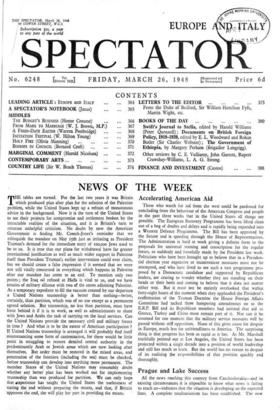NEWS OF THE WEEK
THE tables are turned. For the last two years it was Britain which produced plan after plan for the solution of the Palestine problem, while the United States kept up a refrain of monotonous advice in the background. Now it is the turn of the United States to see their projects for compromise and settlement broken by the intractable realities of the situation, and it is Britain's turn to reiterate unhelpful criticism. No doubt by now the American Government is finding Mr. Creech-Jones's reminder that we relinquish the mandate on May 15th just as irritating as President Truman's demand for the immediate entry of too,000 Jews used to be to us. It is true that our plans for withdrawal have far greater international justification as well as much wider support in Palestine itself than President Truman's earlier intervention could ever claim, but we should create a false impression if it seemed that we were not still vitally concerned in everything which happens in Palestine after our mandate has come to an end. To mention only two points ; the Iraq oil refined at Haifa is vital to us, and we have treaties of military alliance with two of the states adjoining Palestine. As a temporary expedient to fill the vacuum created by our departure a United Nations trusteeship is better than nothing—better, certainly, than partition, which was of no use except as a permanent agreed solution. But trusteeship, no less than partition, must have force behind it if it is to work, as well as administrators to share with Jews and Arabs the task of carrying on the local services. Can the United Nations provide the necessary civil and military forces in time ? And what is to be the extent of American participation ? If United Nations trusteeship is arranged it will probably find itself countenancing some form of cantonisation, for there would be little point in struggling to restore detailed central authority in the predominantly Arab or Jewish areas which are now looking after themselves. But order must be restored in the mixed areas, and penetration of the frontiers (including the sea) must be checked, before trusteeship can develop into anything more permanent. The .member States of the United Nations may reasonably doubt whether any better plan has been worked out for implementing trusteeship than was produced for partition. We can only hope that experience has taught the United States the uselesaness of stating the end without preparing the means, and that, if Britain 'approves the end, she will play her part in providing the means.


































